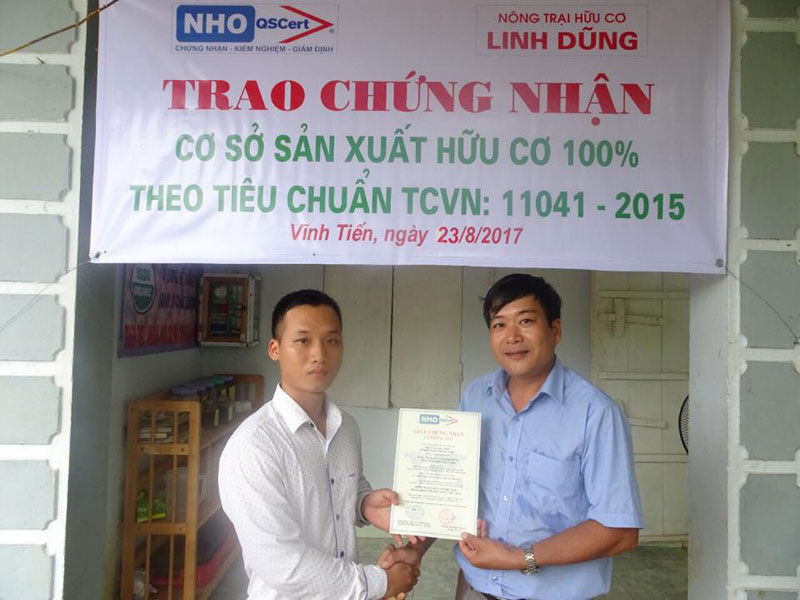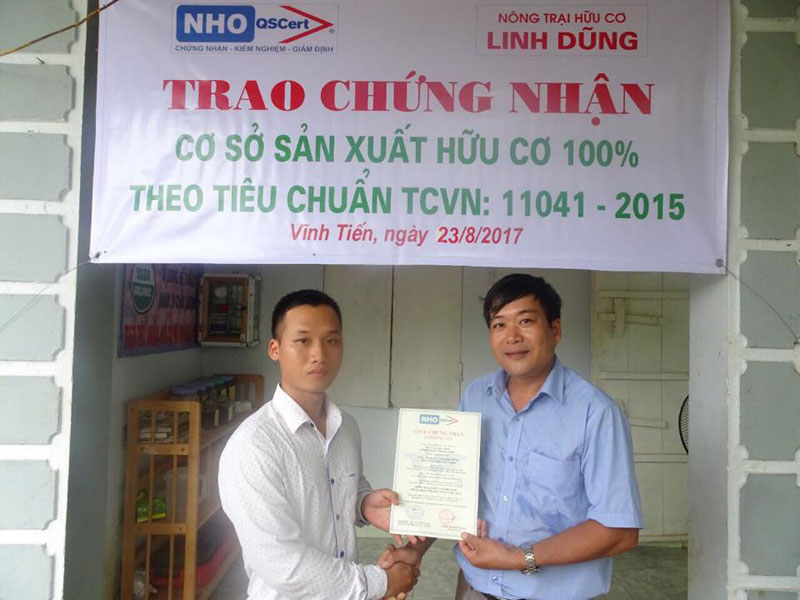
HBO – Nguyen Hong Yen, who manages the Linh Dung organic farm in Dong Ngoai hamlet of Vinh Tien commune (Kim Boi district), is considered the first Vietnamese planting organic citrus. His farm’s citrus fruits were recently recognised by the NHO- QSCERT as organic products in conformity with Vietnam’s organic agricultural requirements TCVN 11401:2015.

Nguyen Hong Yen (right) is the first Vietnamese receiving
NHO- QSCERT certificate for organic production facility TCVN 11041:2015.
Along with research and
tests, Yen has applied organic cultivation techniques in his citrus trees at
the 3.2ha farm. According to him, the soil here is used for forest plantation
and not affected by chemical cultivation. Citrus trees are watered with clean
spring water and cared with organic and biological fertilisers, pesticides and
herbicides.
With organic cultivation
methods, Linh Dung farm’s citrus fruits are recognised with five yeses, five
noes, and three safe, including having organic certificate, having food safety
certificate, having field diary, having clear origins and having packing and
label; no stimulants, no chemical fertilisers, no preservatives, no chemicals,
and no genetically modified organism; and safe for producers, consumers and the
eco-environment.
After three years, Linh
Dung has become the first citrus farm in
Vietnamreceiving the certificate of the NHO-QSCERT –
Vietnam’s leading organisation on
assessing and certifying Vietnamese organic standards TCVN 11041:2015.
At present, the farm is
harvesting lemons with an output of more than 4 tonnes and sold at the price of
30,000 VND per kg at the orchard. The farm’s total yield of oranges, grape
fruits and lemons is expected to reach 35 tonnes a year, which are registered
to be purchased by businesses.
However, to ensure his
organic products reach hands of consumers, Yen uses smart stamps which are
applied for the first time in agricultural products of provincial farms.
Together with organic
products, Yen is also providing consultations on GAP and organic cultivation
systems and serving visitors to the farm.
With his citrus orchards,
Yen becomes the first Vietnamese person planting organic citrus trees./.
According to data from the Hoa Binh Provincial Party Committee, the industrial production index for the first six months of 2025 is estimated to have increased by 20% compared to the same period last year. This marks the highest year-on-year growth rate for this period since 2020.
In the first six months of 2025, Hoa Binh province’s export turnover was estimated at 1.145 billion USD, marking an 18.11% increase compared to the same period in 2024. Import turnover was estimated at $ 804 million, a 17.15% increase, which helped the province maintain a positive trade balance.
The lives of the ethnic minority farmers in Tan Lac district have gradually improved thanks to the new directions in agricultural production. This is a testament to the collective strength fostered through the professional associations and groups implemented by various levels of the district’s Farmers’ Union.
With the motto the "product quality comes first,” after nearly one year of establishment and operation, Muong village’s Clean Food Agricultural and Commercial Cooperative, located in Cau Hamlet, Hung Son Commune (Kim Boi district), has launched reputable, high-quality agricultural products to the market that are well-received by consumers. The products such as Muong village’s pork sausage, salt-cured chicken, and salt-cured pork hocks have gradually carved out a place in the market and they are on the path to obtaining the OCOP certification.
In the past, the phrase "bumper harvest, rock-bottom prices" was a familiar refrain for Vietnamese farmers engaged in fragmented, small-scale agriculture. But today, a new spirit is emerging across rural areas of Hoa Binh province - one of collaboration, organisation, and collective economic models that provide a stable foundation for production.
Maintaining growing area codes and packing facility codes in accordance with regulations is a mandatory requirement for agricultural products to be eligible for export. Recently, the Department of Agriculture and Environment of Hoa Binh province has intensified technical supervision of designated farming areas and packing facilities to safeguard the "green passport" that enables its products to access international markets.



